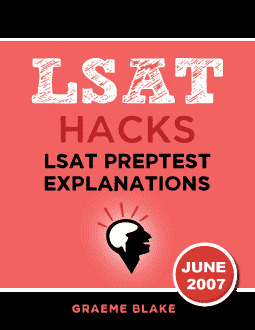QUESTION TEXT: Philosopher: Nations are not literally persons; they have…
QUESTION TYPE: Complete the Argument
CONCLUSION: A nation’s survival requires that many of its citizens have false beliefs. [Prephrased conclusion]
REASONING:
- Nation survive ➞ Sacrifices by citizens ➞ many citizens believe nation has moral rights and responsibilities
- Nations do not have moral rights and responsibilities.
ANALYSIS: The stimulus has the following structure: two conditional statements are joined together and we can draw a conclusion @nation survive ➞ many citizens believe nation has moral rights and responsibilities@. Then as a fact, the stimulus says “nations do not have moral rights”.
So we can say that the necessary condition refers to a false belief. So, the survival of the nation has as a necessary condition “citizens have a false belief [that nations have moral rights]”.
___________
- The argument clearly says that nothing else could prompt citizens to make sacrifices. The “nothing else” refers to the false belief that nations have moral rights and responsibilities.
- CORRECT. This is the conclusion the argument is leading to. It is false that nations have moral rights and responsibilities.Yet nations’ survival requires that citizens have the belief that they do.
- The philosopher never mentions what we can target with moral blame or praise. (Maybe you can blame a nation even if that nation doesn’t have moral responsibilities)
- The author doesn’t say which sacrifices are worthwhile. The concept never comes up in the argument.
- The author didn’t say this. They might agree that for simplicity of argument it may make sense to think of nations as people. E.g. if you say “The US and China concluded a trade agreement”, you are conceiving of the two nations as something like a person. The author wouldn’t necessarily agree this is a bad thing to do in this case.


Hi Graeme – I am a little bit confused about the conditional chain and SC/NC in this question. The stimulus says “no nation can survive unless many of its citizens attribute such rights and responsibilities to it, for nothing else could prompt people to make the sacrifices national citizenship demands.” Based on that, why isn’t the chain written as:
nation survives –> citizens attribute rights&responsibilities –> citizens make sacrifices?
Thank you for your help!
Great question. So, it says that *nothing else* (besides attribution) could prompt the sacrifices. So if you have sacrifices, you have the attribution.
Now it also sounds like the attribution is sufficient for sacrifices, because it prompts them. But the nothing else makes it necessary, and that lets us add it to the chain that way too.
And the argument says national citizenship *demands* sacrifices, making sacrifices a necessary condition for something else. It is implied that the demands of national citizenship are necessary for survival.
Hopefully that makes sense! Drawing this one depends as much on an intuitive understanding of the concepts as on looking at the indicator words.
I’m also not sure I would defend my interpretation of how to draw it 100%. I don’t think it’s the core issue. The core issue is that nations aren’t persons, but thinking that they are persons is important for citizens. That gets us to B, we need false beliefs for a nation to survive.